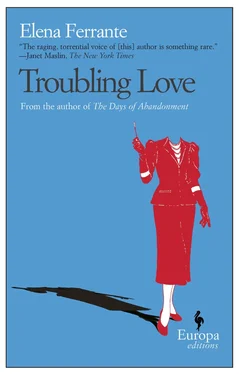I didn’t like the way he had spoken to me. It was a tone of voice that gave orders and did not admit replies. I thought of crossing the room and telling my former playmate that I was leaving. But I was restrained by the way I knew I looked and by that formula: playmate. What sort of play? There had been games that I played with him only to see if I knew how to play as I imagined Amalia secretly did. All day my mother pedaled on her Singer like a cyclist in flight. At home she was modest and reserved, hiding her hair, her colored scarves, her dresses. But, just like my father, I suspected that outside the house she laughed differently, breathed differently, orchestrated the movements of her body in such a way as to make people stare. She turned the corner and went into the shop of Antonio’s grandfather. She slipped around the bar, ate pastries and sugared almonds, meandered past counters, machines, and pans without getting dirty. Then Caserta arrived, and opened the iron door, and they went down together to the cellar. Here my mother loosened her long black hair and that abrupt movement filled the dark air smelling of earth and mold with sparks. Then they both lay down on the floor on their stomachs and crawled along, laughing. The cellar in fact extended as a long, low space. One could advance only on all fours, amid bits of wood and iron, crates and crates full of old tomato sauce jars, the breath of bats and the rustling of mice. Caserta and my mother crept along, keeping in sight the white squares of light that opened at fixed intervals on their left. They were vents, with nine bars across them and a fine-mesh screen to keep the mice from getting through. Children, on the outside, stared at the darkness and the wells of light, imprinting noses and foreheads with the grid pattern of the screen. They, on the other hand, looked out from the inside, to be sure of not being seen. Concealed in the darkest areas, they touched each other between the legs. Meanwhile I distracted myself, in order not to cry, and, since Antonio’s grandfather did not make a move to hinder me but hoped to get revenge on Amalia by making me die of indigestion, stuffed myself with candies, with licorice, with cream scraped from the bottom of the bowl it was made in.
“208, on the second floor,” an attendant said. I took the key and declined the elevator. I went slowly up a broad staircase, along which ran a red carpet, held in place by gilded rods.
Room 208 was sordid, like a room in a third-rate hotel. It was at the end of a dimly lit dead-end corridor, next to a closet carelessly left open and full of brooms, carts, vacuum cleaners, dirty laundry. The walls were of a yellowish color and above the double bed was a Madonna of Pompeii; a dry olive branch had been inserted between the nail and the triangle of metal that held the image in the frame. The bathroom fixtures, which, given the pretensions of the hotel, should have been sealed, were dirty, as if they had just been used. The wastebasket hadn’t been emptied. Between the bed and the wall was a narrow passage that allowed one to get to the window. I opened it, hoping that it would have a view onto the sea: naturally it faced an internal courtyard. I realized that it was no longer raining.
First I tried to telephone. I sat on the bed, avoiding looking at myself in the mirror opposite. I let the telephone ring for a long time, but Uncle Filippo didn’t respond. Then I rummaged around in the plastic bag where I had stuck the things my mother had in her suitcase, and took out the bathrobe of ivory-colored satin and the short blue dress. The dress, thrown hastily into the bag, was all wrinkled. I laid it out on the bed, smoothing it with my hands. Then I took the bathrobe and went to the bathroom.
I undressed and took out the tampax: my period seemed to have abruptly ended. I wrapped the tampon in toilet paper and threw it in the wastebasket. I examined the base of the shower: disgusting short black hairs were scattered along the edges of the porcelain. I let the water run for a long time before getting under it. With satisfaction I realized that I could master the need to hurry. I was separated from myself: the woman who wanted to be shot off like an arrow, eyes wide open, was observed dispassionately by the woman under the water. I soaped myself carefully and did so in such a way that every gesture belonged to an external world without deadlines. I wasn’t following anyone and no one was following me. I wasn’t expected and I wasn’t expecting visits. My sisters had left for good. My father was sitting in his old house before the easel and painting Gypsies. My mother, who for years had existed only as an annoying responsibility, at times nagging, was dead. But as I rubbed my face vigorously, especially around the eyes, I realized with unexpected tenderness that in fact I had Amalia under my skin, like a hot liquid that had been injected into me at some unknown time.
I wrung out my wet hair until it was almost dry, and looked closely in the mirror to make sure that no mascara remained on my eyelashes. I saw my mother just as she was represented on her identity card and smiled at her. Then I put on the satin robe, and for the first time in my life, in spite of the ugly ivory color, had the impression of being beautiful. I felt, for no apparent reason, the same pleasant surprise as when I found in unlikely places gifts that Amalia had hidden, pretending to have negligently forgotten dates and celebrations. She kept us in suspense until, suddenly, the gift appeared, in some everyday place that had nothing to do with its exceptional nature. Seeing us happy she was happier than we were.
I suddenly understood that the contents of the suitcase had been intended not for her but for me. The lie I had told the salesgirl at the Vossi sisters’ shop was in fact the truth. Even the blue dress that waited for me on the bed was certainly my size. I realized it as if it were the robe itself on my skin telling me. I put my hands in the pockets, sure that I would find the birthday card. And in fact it was there, placed on purpose to surprise me. I opened the envelope and read Amalia’s girlish writing, with the ornate letters that no one knows how to make anymore: “Happy birthday, Delia. Your mother.” Immediately afterward I realized that my fingers were slightly sandy. I put my hands in the pockets and discovered that at the bottom was a thin layer of sand. My mother had worn that robe before drowning herself.
I didn’t notice that the door had opened. Instead I heard someone locking it. Polledro took off his jacket and threw it on a chair. He said in dialect:
“They won’t give me a lira.”
I looked at him in bewilderment. I didn’t know what he was talking about: maybe a bank loan, maybe money at interest, maybe a bribe. He was like a weary husband who thought he could tell me his troubles as if I were his wife. With his jacket off, you could see the shirt swelling over the belt of his trousers, the chest and the large heavy breasts. I got ready to tell him to leave the room.
“Instead they want back the money they advanced.” He continued his monologue from the bathroom and his voice reached me through the open door together with the flow of urine into the toilet. “My father asked Moffa for money without telling me. At his age, he wants to restore the old pasticceria on Via Gianturco and do with it who knows what. He told a pack of lies, as usual. So now Moffa won’t trust me anymore. He says I don’t know how to control the old man. They’ll take away the shop.”
“Weren’t we supposed to have lunch together?” I asked.
He walked past me as if he hadn’t heard. He went to the window and lowered the shade. The only light came faintly from the open door of the bathroom.
Читать дальше












